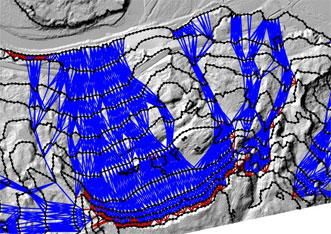Floating offshore wind energy is quickly becoming a viable source of affordable, renewable energy in the U.S., however, offshore wind turbines are susceptible to damage from high winds and waves.
Researchers at Oregon State University, received $1.25 million from the U.S. Department of Energy to simulate the combined and complex effects of wind and wave forces on turbines by conducting physical experiments and numerical models. Barbara Simpson, assistant professor of structural engineering, is the principal investigator. Her colleagues on the project include Bryony DuPont, associate professor of mechanical engineering and the Boeing Professor of Mechanical Engineering Design, Bryson Robertson, associate professor of coastal and ocean engineering and co-director of the Pacific Marine Energy Center, Pedro Lomónaco, director of the O.H. Hinsdale Wave Research Laboratory, and Ted Brekken, professor of electrical and computer engineering
“There is a considerable need to develop open-source, flexible, modular frameworks that expand the capacities of physical testing facilities to accelerate the development of the U.S. floating offshore wind industry.” said Simpson. “In this simulation, the physical and numerical portions interact through sensors and actuators to represent the response of a floating-offshore wind turbine to combined wind and wave loading, where the wave is simulated physically at the multidirectional wave basin at OSU and the wind is simulated numerically.”
The physical experiments will be conducted at the O.H. Hinsdale Wave Research Laboratory, which is the largest nearshore experimental facility at an academic institution in the U.S.
The Oregon State project is one of 13 selected by the DOE to receive a total of $28 million to advance wind energy nationwide. While utility-scale, land-based wind energy in the United States has grown to 96 gigawatts, significant opportunities for cost reductions remain, especially in the areas of offshore wind, distributed wind, and tall wind.



